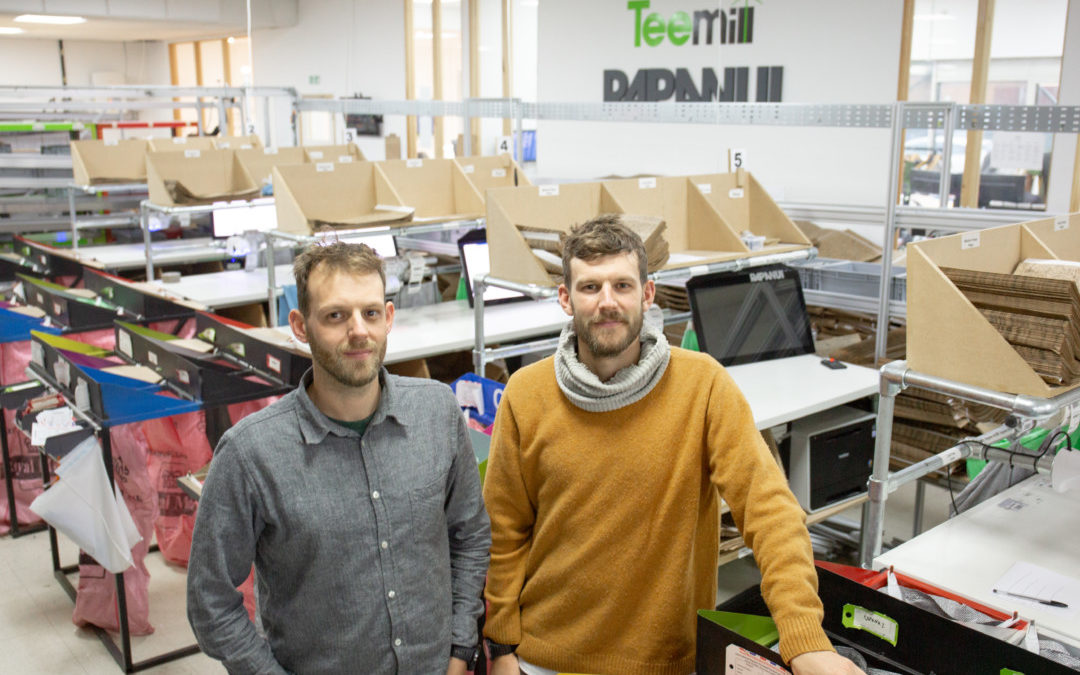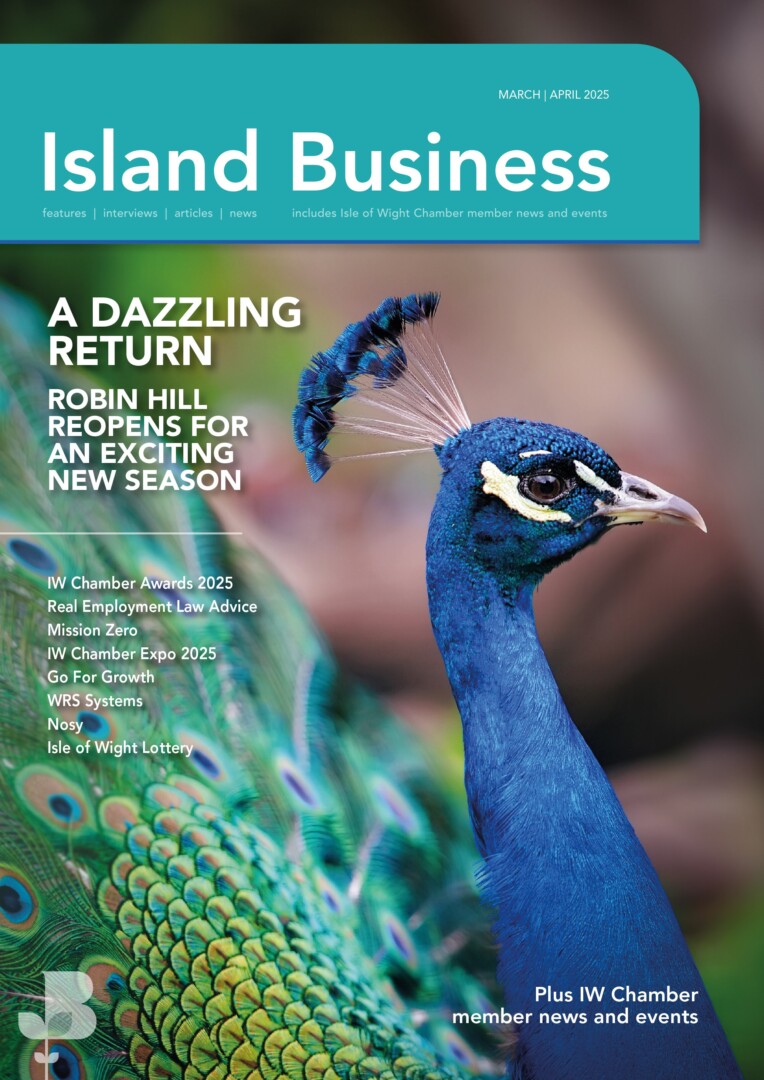Ten years ago brothers Martin and Rob Drake-Knight went into business. It was an inauspicious start; they were based in a shed, in their parent’s garden. A decade later Kate Moss is wearing their t-shirts and new expansion plans will see them employ 175 people at their Freshwater factory. Their eco-clothing brand Rapanui continues to be the label of choice for sustainably aware fashion fans; meanwhile their Teemill Tech business prints t-shirts for clients in their renewable-energy powered factory. All their shirts are custom made from organic cotton. Martin talks to Tom Stroud.
Is this a fashion business or a tech business?
Definitely a tech business first. What we’re trying to do is use technology to solve the issues in fashion. I grew up wanting to do something about the issues around waste sustainability. It’s obvious that we shouldn’t be burning or landfilling 99% of our textiles. If we can use the sun to drive an electric car, why wouldn’t you do that? The problem isn’t that people don’t care. Actually it’s that the solution is quite difficult or we don’t know how to do it. Businesses, brands and engineers need to fix the problem and come up with new ways of solving the problem.
Where did the idea come from for Rapanui?
We were so annoyed by the amount of waste in the fashion industry. We felt like we had to do it! We were passionate about the issues around sustainability and we wanted to do something about it. Also we wanted to buy products that didn’t exist and we thought ‘why don’t we just make them?’.
You then went on to launch Teemill, producing clothing for other businesses. What have you learnt about starting businesses?
You don’t need to have a genius idea or a gap in the market. The idea that you have to have this Eureka moment is actually stopping a lot of what would otherwise be very good business people getting started. Our business idea is stupid. It’s really bad! Selling t-shirts is not a good business idea but we believed in what we wanted to do. The t-shirts were aligned with our values. Hard work and a passion for what you do, and a belief in the value and the values of your business is really all you need.
Looking back, like all businesses, we learnt our most valuable lessons from making mistakes. I think sometimes as a new business you need to give yourself a break. The journey from a startup to a successful business is pretty much all mistakes and you only find the solution at the end. You have to like solving problems.
All businesses have a financial component but I think it’s a mistake to start a business just purely for money. All the best bands in the world probably do pretty well financially but they didn’t start out in a garage thinking ‘what sort of song will make the most money?’.
What’s it like running a business like this on the Island?
One of the great things about being here is that we do not have lots of tech companies and we don’t have lots of fashion businesses. We don’t have lots of capital or cash either so it all combines to force you to come up with new and innovative ways of solving problems. That’s definitely been a huge advantage. You don’t want to create a business that already exists. If you want your business to be a success it has to be new and different in some way, whether you find that out after you’ve started or before! That naivety has really helped us come up with different ways of doing things and those different ways have created the business that it is today.
Your business keeps on growing. It’s a very scalable model. Will you always be based here?
Yeah! The Isle of Wight’s the greatest place in the world. Why would you move anywhere else? That’s the great thing about the internet. I always say to people that
We’ve got a fixed link already – a digital one, to the internet. It’s an infinite amount of traffic, in real time, it costs nothing and it’s connected to every home anywhere in the world. All you’ve got to do is figure out how you can get money across it, from the rest of the world, into your bank account.
We don’t believe that we deserve in any way to be as big as Amazon but the trick I think is to remove all of the reasons why we couldn’t be. Then you’ve got the choice about what we want to become as a business. The growth and the scale that we have at the moment is I guess similar to that sort of tech company but it’s happening on the Isle of Wight, and we shouldn’t be surprised about that.
FACTFILE
Teemill Tech Limited is increasing its capacity tenfold and plans to create 100 jobs after purchasing a 15,000 sq. ft site to build a new facility at Hooke Hill in Freshwater.
Manufacturing capacity will increase from over 50,000 t-shirts a month to a t-shirt per second within the next three years
100 new jobs will be created, bringing its workforce to 175
The business has grown exponentially, doubling its customer base year-on-year since launch in 2010.
Teemill Tech’s current manufacturing site in Freshwater is powered entirely by renewable energy and utilises robotics and AI to modernise the t-shirt manufacturing process, aiming to create efficiencies to make sustainability affordable.
The company has developed a plastic-free circular supply chain. Every product is designed to be returned and exchanged for store credit when it is worn out. In turn, new products are made entirely from recovered material.
Back to the start: How the Isle of Wight Lottery helped Rapanui to establish itself as a business, with key funding at a crucial time.
Rapanui is just one of the many business helped by interest-free loans from the Isle of Wight Lottery. Since its inception in 2001 the Isle of Wight Lottery has helped create thousands of local jobs by giving financial support to growing businesses.
After just a year in business Rapanui received a loan of £5,000 and a year later in 2011 they received a further £20,000 from the Isle of Wight Lottery.
“We needed some working capital to get started,” Martin explains. “The loans allowed us to accelerate what we had already thought would be a good venture. From day one we were taken seriously, which was fantastic. We needed capital and being interest free it meant that we weren’t getting into further debt.
“Going before the loan panel to apply for our funding was a good experience which prepared us really well for the future. It was thorough and it was professional and that’s what you want. There were good people on the panel that knew their stuff. They looked closely at our numbers and they wanted to see a professional financial case with a business plan and a cash flow forecast.
“They want to see you do well and they weren’t there to catch us out. At the same time they aren’t going to finish your sentences for you. It’s business and you have to take it seriously. When we walked in there we were in our early twenties but they treated us like businessmen. That’s really impressive when I think back to it. The whole experience set us up for when we made cases for bigger contracts like we do now with international scale contracts.”
Rapanui borrowed the money because they wanted to employ more people, expand the custom clothing side of the business and open a retail shop, creating ten jobs.
“The lottery loan process was useful because it was quite stringent and it helped us to form a really strong business plan before we applied for the loans,” Rob says. “I think Island businesses are lucky to have the Lottery available as a resource. It’s very reassuring to know that if you do need extra capital to grow your business then the support is there. IW Lottery players are supporting the growth of the Island’s economy and creating jobs. I think every business that has received a loan from the IW Lottery appreciates the support they have received and it wouldn’t have been possible for us to borrow the money without the people who play every week.”
Find out more about interest free business loans from the Isle of Wight Lottery by calling 01983 529888.
Winning start: Brothers Rob (left) and Martin Drake-Knight in 2010, collecting their IW Chamber Business Award for Start Up Business of the Year.



